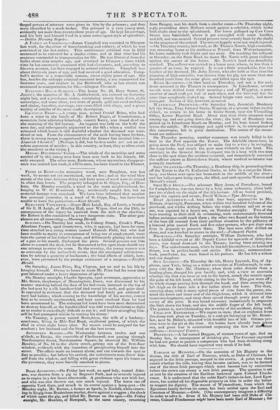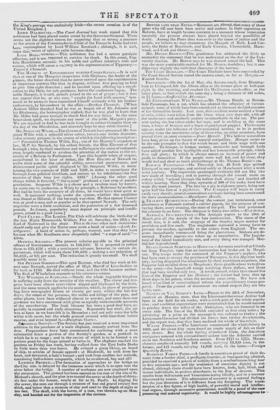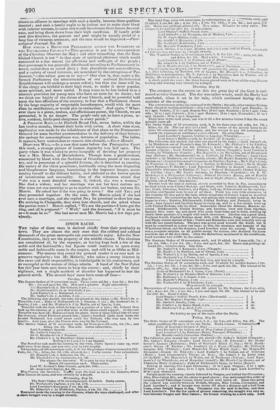thfi Kings peerage was exclusively Irish—the recent creation is of
the United Kingdom.] LORD DALHOUSIE.—The Court 'omit& last week stated that this nobleman had been placed under arrest by the Governor-General. There seems not the slightest reason for supposing that so strong a measure as the arrest of the Commander-in-Chief of the Forces in India had ever teal; contemplated by Lord William Bentinck ; although, it is said, some ditt;:ences of opinion exist between them.
Dorm:
Loin) GIIMOThis nobleman has had a severe paralytic
affection, and is not e lu expected to survive fe shock. In this event, Cap- ; tam n Hutchinson succeed to his noble and gallant relative's title and estates, which will cause a vae.Siley in the representation of Tipperary.— Limerick Chronicle.
TIIE MARQUIS OF LONDONDERRY TVIINED CROHWDLLIAN.—It IS Said that at one of the Marquis's interview's with Hepburn, the leader of the pitmen, the latter observed that he never entered upon the consideration of important matters like that in dispute, without first praying to God to give him right direction ; and he insisted upon offering up a suppli- cation to the Deity for safe guidance, before the conference began. The noble Marquis, it is said, piously joined in the act of prayer ; but it does not appear that he, at any rate, " sought the Lord with success," inas- much as he seems to have committed himself seriously with his brother coal-owners, by his conduct in the affair.—Durkam Chronicle. [When Andrew Miller thanked God he was at length rid of Dr. Johnson and his Dictionary, the lexicographer replied, that he was glad to learn that Mr. Miller had grace enough to thank God for any thing. In the same benevolent spirit, we deprecate any sneer at the noble Marquis's piety. We are rejoiced to find he has been brought to calmer thoughts than on the day of the Dissolution, and sincerely hope he may abide therein.] S atm EINT WILDE.—The electors of Newark have presented Mr. S er- . sreant Wilde with a splendid silver salver, twenty-one inches diameter, value seventy guineas, in the centre of which is the following inscription : —" Presented to Thomas Wilde, Esq., one of his Majesty's sergeants at law, M.P. fin. Newark, by his ardent friends, the Blue Electors of that borough ; who, by their exertions and sufferings in the cause of independ- ence, largely conduced to awaken the attention of the nation to the ne- cessity of a Reform in Parliament. Upon this humble token of respect, contributed in the hour of defeat, the Blue Electors of Newark in- scribe their sense of the splendid ability, unwearied perseverance, and disinterested public spirit displayed by Mr. Sergeant Wilde, in main- taining the two contests of 1829 and 1830, in order to emancipate the borough from political thraldom, and restore to its inhabitants the free exercise of their long lost rights. 1831." [Among the other good things which it fostered, " the system" produced a vast crop of pseudo- patriotism. Sergeant Wilde is a clever and a resolute man by nature, an acute one by profession, a Whig by principle, a Reformer by accident. But had he been the contrary of all these, he would have done quite as well. It mattered nothing, under the system, whether the candidate was liberal or illiberal, if the borough was close. He that opened Chester was as good a man and as popular as he that opened Newark. The only requisites were a little resolution, and the possession of a few thousand pounds. In future, popularity must depend on principle and intelli- gence, joined to a good cause.] PITT CLUBS.—The London Pitt Club will celebrate the birth-day of the late Right 'Honourable William Pitt on Saturday, the 28th; the Earl of Hairewoo(j in the chair. This is Mellow when such inytitutions should rally and give the Tories once more a bond of union.—Leeds In- telligencer. A bond of union is, perhaps, wanted, now that they have become what Mr. Goulburn once eloquently called "a rope of sand."— Globe.
OFFICIAL SALARIES.—The present salaries payable to the principal officers of Government amount to 159,845/. It is proposed to reduce them to 135,423/. ; with a contingent advance, however, in certain de- partments, which will make them 139,423/. ; making a net reduction of 20,4224, or l21 per cent. The reduction is greatly too small. We shall possibly recur to it.
Sin JEstsost Gonnou.—This aged Baronet, who died last week at his seat near Newark, served the office of High Sheriff of Lincolnshire so far back as 1783. He died without issue, and the title becomes extinct. The Earl of Winchelsea succeeds to his extensive estates.
Tiiu virEATima IN SCOTLAND.—Nearly the whole vegetable kingdom is suffering sadly from the severity of the weather. The clover and rye- grass have been almost everywhere nipped and blackened by the frost, and the same remark applies to the pastures, which, in place of progress- ing, have retrograded fifteen or twenty per cent. within the last few days ; the stems of the potatoes, the stalks and foliage of the peas, and other plants, have been withered almost to powder, and more than one gardener we have conversed with gives us equally unfavourable accounts of the strawberries. The fruit blossom has been a good deal hurt, es- pecially in exposed and early situations. Repeatedly last week, the air was as keen as we have felt it in December ; and not only were the hills white with snow, but the whole ground covered with hoar-frost before sunrise, and even beyond it.—Dumfries Courier.
Zoitmooicat. Socnerv.—The Society has just received a most important addition in the purchase of a male elephant, recently arrived from Ma- dras. Preparations have been commenced for enclosing with a most substantial fence a portion of the Society's garden, as a paddock in which he is to range ; and in the centre of which is to be formed a ca- pacious pond for the huge animal to bathe in. The elephant reached the gardens on Friday last week, having walked from the East India Docks in little more than two hours. He evinced a great liking, on board of ship, to articles of female apparel : at Blackwall, he took from her head, and devoured, a lady's bonnet ; and took from another her reticule, containing half-a-dozen nonpareils, which he swallowed, bag and all! LONDON BRIDGE—The formation of approaches to the bridge on the City side, is delayed by the immense sewer which is to open into the river below the bridge. A number of workmen are now employed upon the excavation. The ground has been opened on the east of the site of St. Michael's church, and the plan is to tunnelthe sewer at the depth of thirty- six feet under the houses, nearly as far as St. Paul's. In digging for the sewer, the men cut through a stratum of fine red gravel twenty feet thick, and below that a stratum of clay and sand to the depth of eight or ten feet. The skull, with the horns, of a ram, was thrown up on Mon- .day, and handed out for the inspection of the curious. BETTER LATE THAN NEVER.—Rumours are abroad, that many of those peers who till now have been active and zealous in their opposition to Reform, have at length become converts to a measure whose imperative necessity the present electors have placed beyond the possibility of doubt. Among the Peers thus won over to the cause of justice and the people, we believe we nut), enumerate the Marquis of Bath, Lord Car- teret, the Duke of Buccleuch, and Earls Cawdor, Chesterfield, Hare- wood, and Cork and Orrery.—Sun.
DENNIS BROWN.—This gentleman has addressed the Globe to contradict the statement that he was maltreated on the day of the Uni- versity election. Mr. Brown says he was chaired round the hall. This was the more comfortable method for Mr. Brown, doubtless ; but it mo- difies very slightly the turbulent character of the mutiny. THE COAST BLOCKADE.—The Coast Blockade have been superseded by the Coast Guard Service round the eastern coast, as far as Margate, Kentish Gazette.
ExerarrioN.—On the 1st of May, the Aurora coach' from Birming- ham to Liverpool, left the Albion office at the former place at half-past eight in the morning, and reached the Wellington coach-office, at the latter place, at four o'clock the same day ; being a distance of 101 miles, in n hours.—SaseimIshire Advertiser.
AN EXTRAORDINARY WET NURSE.—Mr. Thomas Battle, at Broom- field Parsonage, has a cat, which has adopted the offspring of various animals, sonic of which have been considered as the most decided enemies of the Grimalkin family. Last year, this excellent nurse suckled a brace. of cubs, which vere taken from the vixen when two days old, with all the tenderness and inotherly anxiety so remarkable in the cat. The pre- sent spring she has taken under her care, and is suckling at the same time, a brace of leverets and a brace of greyhound puppies. The leverets appear, under the influence of their unnatural mother, to be in perfect security from the murderous gripe of those who, on other occasions, have proved their greatest enemies.—Essea. Herald. [We believe naturalists have long given up the theory of natural antipathies. Hunger seems to be the sole prompter to that war which beasts and birds wage with one another. To hunger, in human society, monarchs and borough lords have added another less intelligible and less honourable principle, which_ they call glory; by which is always meant an increase of power and profit to themselves. If the people were well fed, and let alone, they would feel and show as much philanthropy as Mr. Thomas Buttle's cat. RAILWAY PASSENDEItS.—On Thursday last, 49 Irish pigs quitted Liverpool in one carriage, and arrived safely at Manchester after a most noisy journey. The respectable quadrupeds evidently did not like the new mode of travelling ; and in passing through the tunnel, made an outcry which " echoed through the hollow dark abyss," and startled all within hearing. Since that time, upwards of 300 of the tusky herd have made the same journey. The fare for a pig is eighteen pence, being not quite half the fare of a pig-driver. The Company will begin to carry cattle very shortly, several commodious carriages having been constructed for their accommodatimi.—Manchester Herald.
ZEALOUS Quin Nexcs.—During the contest just terminated, some gentlemen at Falmouth trained a carrier pigeon, for the purpose of con- veying there, every evening the state of the poll. The bird performed the journey in an hour. The distance is thirty-two miles.-11'est Briton. • ANTIGUA INSUERECTION.—The Antigua papers to the 26th of March give all the details of the late insurrection. The cause of the revolt was, it is said, the stoppage of the Sunday negro market for provisions and live stock. The magistrates stationed a strong -force to prevent the market, agreeably to the orders from England. The ne. groes immediately commenced firing the plantations. Sixteen are de- stroyed. Twelve negroes are taken up as incendiaries. The Legisla- ture of the island immediately met, and every thing was tranquil. Mar- tial law is proclaimed. REVOLUTIONARY SYMPTOMS IN MOROCCO.—ACCOIIIIIS received at Gibral- tar from Tangier, state that an insurrection had broke out in 'Mogul- nez. The troops under the command of the Emperor's nephew, who had been sent to occupy the province of Tremeyen, in the Algerine terri- tory, having disgusted the inhabitants by their exorbitant exactions, the Emperor had recalled them to Mequinez ; there gratifications were given to the armv—the household troops receiving three dollars, mid those that had been recalled only two. A revolt ensued, which threatened the lives of the Emperor and his Minister ; the former had been shut up three days in his palace, when the accounts came away. We have not heard what kind of constitutional reform the expeditionary troops pro- posed. From the ground of discontent we rather suspect they are bit. by-bit men. NATIVES OF VAN DIEMEN'S Lss:n.—Papers to the 20th of November, received on Monday, state, that the Lieutenant-Uovernor Arthur had been in the field for six weeks, with a sixth part of the whole popula- tion ; and confident expectations were entertained that he would succeeti in putting down the tribes of the Aborigines, who are hemmed in on • every side. The line of the British extended at first sixty miles ; by advancing on a point on the sea-coast it was reduced to twelve ; the Lieutenant-Governor had divided his forces into twelve detachments, and the report was, that they have enclosed the whole of the rebels. Wiwai PISIIIIRY.—The Americans commenced the whale-fishery in 1690, and for about fifty years found an ample supply of fish on their own shores. But the whale having abandoned them, the American navigators entered with extraordinary ardour into the fisheries carried on in the Northern and Southern oceans. From 1771 to 1775, Massa- chusetts employed annually 183 vessels, carrying 13,820 tons, in the former, and 121 vessels, carrying 14,026 tons, in the latter.—Foreirs Quarterly Review. RATIONAL Faulty PRIDE.—A family is sometimes proud of their de- scent from a border chief, a profligate courtier, or buccaneering admiral, provided he received a patent of nobility from a semibarbarousking four or five centuries ago ; and the sentiment of conscious dignity is not abated, although there should have been knaves, fools, halt, blind, and insane individuals, in profuse abundance, in the line of descent. This • results from Self-esteem and Veneration acting blindly, and in a manner disavowed by reason. The admiration of ancestry is a natural feeling; but the just direction of it is different from the foregoing. The trans- mission of a fine figure, of high health, of powerful moral and intellec- tual organs through successive generations, would be a proof of the race possessing real natural superiority. It would be highly advantageous $of-- Obtain an alliance in marriage with such a family, because these qualities descend ; and such a family ought to be jealous not to unite their blood with inferior streams, because this would deteriorate their future descend- ants, and bring them down from their high condition. If family pride took this direction, the peasant and peer might be equally proud of a long line of virtuous ancestors, and the race would be improved.-Phre- nological Journal, No. 28. How WOULD A REFORMED PARLIAMENT AFFECT THE INTERESTS OF TUE ESTABLISIIED CHURCH ?-11tis question is put by a correspondent of the Christian Observer for May : and after remarking that the Esta- blished Church is not " in that state of spiritual efficiency which would command to a due extent the affections and suffrages of the people ; that patronage is too generally distributed according to Parliamentary in- terest, rather than to sound piety ; that pluralities and non-residences, and a variety of venal interests, are nourished by the corruptions of Par- liament,"-the editor goes on to say-" Our view is, that under a Re- formed Parliament the administration of our national Ecclesiastical Establishment will undergo a severe ordeal ; but that the 'issue will be, if the clergy are faithful to their high trust, to make it more popular, more spiritual, and more useful. It may come to be less looked to as a sinecure provision for young men who have no taste for its duties ; but we think too highly of the claims of our Church, and its powerful hold upon the best affections of the country, to fear that a Parliament chosen by the large majority of respectable housekeepers, would wish for more than its rectification, or would plot its extinction." And again, " Wher- ever-there is a pious, zealous, and affectionate pastor, the Church, we are persuaded, is in no danger. The people only ask to have a pious, ac- tive, resident, fairly-paid clergyman in every parish." A Pacnaelc RAcE.-At Hatfield Broad Oak, seven ladies, within the last twelve months, blessed their lords with twins. A short time sioce, application was made by the inhabitants of that place to the Postmaster- General for some further accommodation in the delivery of their letters ; the apology for non-compliance was, fewness of population. The ladies, it appears, have undertaken to remove this obstacle.-Essex Herald.
DISPUTED a case that came before the Prerogative Court this week, a strange picture of human depravity was laid open. The party whom it was wished to prove incapable of devising her property was a Mrs. Morris, of Horselydown. Though born a gentlewoman, connected by blood with the Newtons of Grantham, proud of her ances- try, and in possession of a splendid fortune, site is described as courting the society of the vilest prostitutes, habitually using the most disgusting and blasphemous language, luxuriating in the impurest images, accus- toming herself to the filthiest habits, and addicted to the lowest species of intoxication and sensuality. One of the witnesses stated that "she was a most dreadful woman, if, indeed, she was a woman." She died a widow, and her marriage was not her least curious act. She went out one morning to go to market with her basket, and met Mr. llorris. He asked her if she was going to town ? She said Yes ; and they proceeded together. On the road, Mr. Morris asked, if she had ever seen a marriage, and she replied No; he promised to show her one. On arriving in Cheapside, they went into church, and she asked where the parties were ? Morris replied, "We are the parties-I have got the ring, and all is prepared." " 'Well," said the deceased, "if it must be so-it must be so." She had never seen Mr. Morris but a few days pre- vjously.




























 Previous page
Previous page